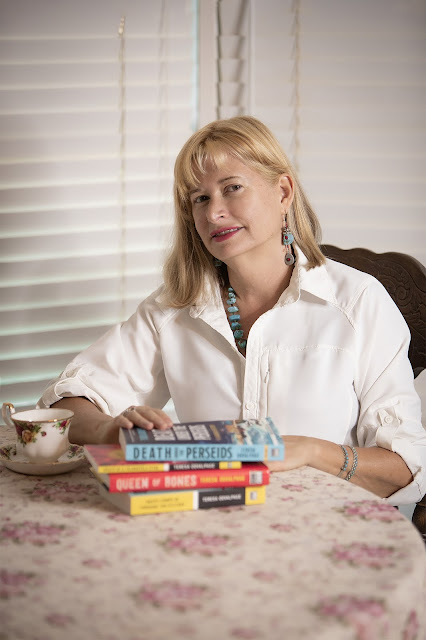Teresa Dovalpage
Teresa Dovalpage is a college professor and author of three theater plays and twelve novels. The last four belong to the Havana Mystery series published by Soho Crime. Death under the Perseids is the most recent one, set on a cruise ship headed for 
My Q&A with the author:
How much work does your title do to take readers into the story?Visit Teresa Dovalpage's website.
It works nicely. There is a death (in fact, several deaths) in the story, and a key action takes place during the Perseid meteor shower. But I must say that The Tears of Saint Lawrence would have been a good title too. In fact, that’s the one I will use for the Spanish version. Las lágrimas de San Lorenzo is the meteor shower’s name in Spanish because it happens on or around St. Lawrence feast day, August 10th. Lorenzo is a main character (the protagonist’s true love and an amateur astronomer) so it would be fitting as well.
How surprised would your teenage reader self be by your new novel?
My teenage self wanted to be a writer so she would say something like “Pero of course!” She also loved mysteries and would be pleased with my last four novels. But there would be a surprise for her. I don’t think my teenage self would have ever considered writing in English, a language I didn’t start using daily until I was thirty years old.
Do you find it harder to write beginnings or endings? Which do you change more?
Beginnings tend to be more difficult. Except for the few happy occasions when a story comes to me fully formed, it takes me a while to find the tone and the voice. That usually happens when writing—and rewriting—the first chapter. Once I get them right, everything starts flowing. After I decided to use the first person and found Mercedes’ voice, Death under the Perseids moved very fast. That’s why I have kept Mercedes as the narrator in the sequel and hope to continue with her for at least two more books. It will make my beginnings a piece of cake.
Do you see much of yourself in your characters? Do they have any connection to your personality, or are they a world apart?
Most of them have a little bit of me or are based on people I know. I like to delve into personal experiences (mine or others’) to create believable characters. But in Death under the Perseids, Mercedes was getting too close for comfort—she comes to the United States after marrying an older American; she was a student at the Universityof Havana; she likes to cook—so I tried to erase some of the similarities. She’s more flirtatious than I have ever been, for sure. And she hates reading.
Candela, her Cuban-American Tarot-reading, antique-loving pal, is a composite of two friends of mine. It’s fun to put them in my character’s shoes and imagine what they would do.
What non-literary inspirations have influenced your writing?
Family, for sure. My Cuban familia appears more or less disguised in all my books. Mamina—Mercedes’ grandmother—is based on my own grandma. I used some of her favorite sayings like en boca cerrada no entran moscas (no flies get into a closed mouth). I hope to have also captured her essence: a mix of generosity, acceptance, and no-nonsense attitude.
Pets too. Well, they are part of the family! Nena, Mamina’s rescue mutt, is a fictional version of La Niña, my mischievous English foxhound.
Traveling has also influenced my writing. My husband and I love to go on cruises and I have used them as settings for Death of a Telenovela Star and Death under the Perseids. Cruise ships have that “locked room” feel that works so well for mysteries, but with more opportunities for compelling visuals. Besides, many shenanigans that I witnessed on board have found their way into the books.
Last but not least, I am inspired by Cuba. My native country is a constant presence in my work. Every book I have written up to now contains references to or is set in the island.
The Page 69 Test: Death Comes in through the Kitchen.
My Book, The Movie: Death Comes in through the Kitchen.
Coffee with a Canine: Teresita Dovalpage & La Niña.
--Marshal Zeringue
